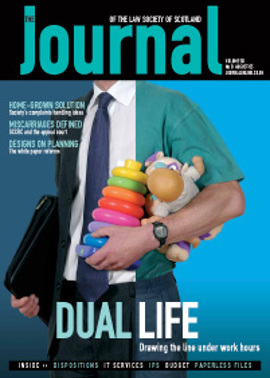A clear duty

Two Scottish cases decided in the Privy Council and reported in 2005 GWD issue 17 are worth inspection. The first (305) is Holland v HMA. Three points were argued for the appellant. The first was that dock identification evidence was so unfair and unreliable as to be incompatible with his article 6 right to a fair trial. The second was that dock identification obliged the appellant to assist the Crown case against him, which infringed the right, again under article 6, against self-incrimination. The third point was that the Crown had acted unfairly in failing to disclose information about charges relating to the two complainers relative to drug dealing from the house in which they were attacked. The first point did not find favour with the court, it being pointed out, in effect, that provided the appellant was present in court, a witness who recognised him was liable to refer to him. However the appeal was allowed, the Privy Council holding that the combination of the failure to disclose the said information and the Crown’s reliance on dock identification had created a situation in which there was a significant risk of mistake, which went beyond that normally associated with eyewitness evidence and about which the trial judge had not given the jury a proper warning.
The second case (306) is Sinclair v HMA, in which the basic situation was that the Crown had relied for corroboration on a witness who contradicted what she had said in two previous statements to police officers. The appeal was, broadly, on the basis that the defence had not been told about these statements, which clearly had potential at least as material for cross examination and an attack on credibility. The appeal was successful and the matter remitted to the High Court to consider whether to grant authority for a fresh prosecution. The Privy Council did not agree with the proposition that it was up to the defence to ask for prior statements and that unless this was done the appellant’s rights could not be breached. It has now been clearly stated as a matter of law that the prosecution is under a duty to disclose all material evidence in its possession both for and against the accused. In this connection, any evidence which might tend to weaken the prosecution case or help the defence is taken to be material. Further, the question of deciding whether evidence is material or not, is not one on which the Crown should be regarded as having the last word.
Don’t wait to be asked
More years ago than one likes to remember there was published a novel called The Ever Interesting Topic. That title might be usefully borrowed now by the discount principle in sentencing, unless of course one prefers The Kraken Wakes. What seemed to have begun as a gentle exhortation to judges to have regard to the accused’s general behaviour when passing sentence is generating a jurisprudence all of its own. In Birt v McQuaid 2005 GWD 15-262 we have a six month sentence imposed on an accused convicted of dangerous driving. As no discount seemed to have been specifically imposed, this was reduced by the appeal court to five months. The appellant, incidentally, had already served two and a half months (which is treated these days as equalling five months, or, if you like, six months with a discount – or possibly seven and a half). In Urquhart v MacDonald 2005 GWD 16-270 the matter becomes, in some ways, a little clearer as the sentencing judge stated that he did not allow a discount because he was not asked to and in any event in the circumstances he would not have done so. It seems clear from the opinion of the court, construing du Plooy (although that case was followed by a perhaps not entirely necessary change in the law), that the burden of considering the effect on sentence of the accused’s subsequent behaviour falls on the sentencing judge. While it is hard to argue with this as piece of statutory interpretation, from the practical point of view it has its drawbacks. It is, after all, the accused and his advisers, and not the court, who know what was offered, when and in what circumstances. Logically it would seem preferable if this was brought to the attention of the court by way of mitigation if thought appropriate.
In Cole v HMA 2005 GWD 21-380, a serious case of robbery, the Court of Appeal (two judges) held that the trial judge should have allowed a 25% discount rather than the 12% actually applied. Sometime, somewhere, someone is going to have to try to synthesise all these cases. For the time being, practically speaking, any agent appearing should be able to state with confidence dates and modes of co-operation, including pleas offered unequivocally even if not accepted, and should ask for the maximum discount available. It may be that some courts are effectively starting at 33% for a plea up to and including the intermediate diet: this is probably over-generous, as it does not allow for the person who admits guilt and provides information when first spoken to by the police, but practically speaking it may be the level at which a difference between soldiering on or not is decided by an accused. It is not likely that many appeals will disclose an over-generous discount.
Abuse and prosecution
There was, one recollects, a feeling when the substantive crime of racial harassment was introduced that whatever the political imperatives, legally there was not really any need for the legislation. Those who held such a view might derive some support from the decision in Martin v Howdle 2005 GWD 20-357, an appeal against conviction by way of stated case. The locus was a football match and the accused, who had been continually shouting racist remarks at players, was found to have caused distress to a schoolboy sitting nearby. The court allowed the appeal and quashed the conviction, holding that as the abuse was directed at players of African origin, only they could in terms of the statute be complainers or victims. This conclusion was reached by virtue of the court, considering the terms of the Criminal Law (Consolidation) (Scotland) Act 1995, holding that it had to consider subsections (1) and (2) of section 50A together. The court was, however, able to substitute a verdict of guilty to a common law breach of the peace with racial overtones, by virtue of the operation of section 96 of the Crime and Disorder Act 1998 and the Criminal Procedure (Scotland) Act 1995, schedule 3, paragraph 14. Whether or not this decision makes the legislation a dead letter remains to be seen. It does, however, seem that the drafting of the Act is such as to limit the scope of the prosecution of racially motivated behaviour in a quite unnecessary and perhaps unforeseen way. It is very doubtful if there is anything to be gained from a situation in which only the person at whom the abuse is directed, and not everyone affronted by it, is regarded as criminally affected. Racial abuse is, after all, a public as well as a private wrong. It is only by emphasising the general detestation by society, rather than the understandable, indeed probable, dislike of the person directly affected, that universal condemnation can be achieved.
The mail must get through
As regards sentencing, it is of course quite wrong to say that certain offences will inevitably attract a prison sentence. One area of offence which has traditionally come near that, however (almost inevitably, perhaps) is that involving misconduct by postmen in respect of mail entrusted to them for delivery. The rationale has been quite simple: unless people have confidence that what they post will be delivered, the service will suffer. Scott v Service 2005 GWD 22-403 was a successful appeal against a sentence of three months’ imprisonment on a first offender for stealing 10 postal packets. The appellant had apparently admitted guilt on detection, had lost his job, had committed the offences over a few days and had now obtained another job where he worked diligently. A period of 200 hours’ community service was substituted. Is public confidence affected? Should it be? Will a different standard of behaviour be required from a delivery service not resonant with the Royal Mail?
Proportionate restrictions
Finally there are two reported cases, generally about freedom to do what we want, and its restrictions. Hume v HMA 2005 GWD 22-411 was an unsuccessful appeal arising, in the first instance, out of the fact that two police officers saw the appellant urinating in public. The appellant walked away, the officers laid hands on him and what was proved to be a breach of the peace and a contravention of the Police (Scotland) Act 1967 followed. It was the appellant’s contention that the officers had no justification for laying hands on him and that his subsequent conduct was thus not criminal. In particular it was argued that the officers had no statutory power of arrest in the circumstances and there was nothing to justify the exercise of a common law power. The court held that the common law question did not have to be answered as the case was covered by section 13 of the Criminal Procedure (Scotland) Act 1995, by which a constable can use reasonable force to ensure that a person suspected of or who has committed an offence remains with him. Quinan v Carnegie 2005 GWD 22-394 concerns a breach of the peace and touches on the right of the subject to protest. The conduct complained of involved the appellant sitting on a road at a naval base, disrupting the traffic and refusing to desist when requested. The appellant was a member of the Scottish Parliament and it was stressed that at the material time he conceived himself as acting as an elected representative. On this point it was observed that there was not before the original court any evidence on which it could be found that the appellant was acting in any capacity justifying treatment different to that afforded the other 20 or 30 demonstrators sitting on the road. The decision of the appeal court was however based on the proposition that whatever the appellant was doing it was contrary to law, and the action taken against him had a legitimate aim and was proportionate. It was also held that where a public representative could demonstrate as well lawfully as unlawfully, there was no reason to hold it disproportionate to apply the law to him in the same way as to other citizens.
In this issue
- Prosecuting bigotry offences
- A hotter than average July
- Advice for all, but what about justice?
- Calling time
- The anti-avoidance drive
- The best option?
- Radical design
- Miscarriages of justice
- Information technology
- IPS... keeping a watchful eye
- When less means better
- Reality check - not Big Brother
- A clear duty
- Missing a generation
- Does age matter?
- Fair picture?
- Book debts: the final word?
- Website reviews
- Book reviews
- Challenging the sacred cows of conveyancing






